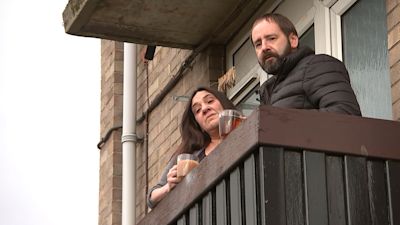'We just about exist' - Families relying on Universal Credit plead with government not to take away extra help

Video report by ITV News UK Editor Paul Brand
Families relying on Universal Credit during the Covid-19 pandemic are pleading with the government not to take away the extra help.
Claimants have been receiving a £20-a-week temporary uplift as support during the unprecedented times. But the extra boost in Universal Credit expires in April.
Boris Johnson has refused to guarantee to keep the £20 weekly rise in April, as he suffered a backbench MP rebellion supporting an extension.
More than one-third, 38%, of Universal Credit claimants are working.
They include Tony, who delivers leaflets. He gets 11p for each one. If he works solidly, he gets £50 a day.
Before that, he ran a business. But it went bankrupt and he ended up homeless.
For three years, he's been on Universal Credit, meaning he can now afford a small flat in York.
He lives there with his partner Sue, who has disabilities and cannot work.
"We don't live an extravagant lifestyle, we just about exist," Tony told ITV News.
The £20 uplift in Universal Credit means Tony and Sue have paid off some bills they owed, despite Tony's work drying up during the Covid-19 pandemic. Before the rise, they were falling into arrears.
Now Sue fears going backwards. "This is why we don't want that little bit of help taken away, it's wrong."
Claimants have doubled during the pandemic to 5.9 million people. Many of those are people who've never conceived of claiming benefits. Research shows a large proportion are young and previously well paid.
That includes Daniel, an estate agent, and his family.
During the pandemic his work dried up too. He now works part time only, with his wife furloughed from her job. They have two children.
"It's a thing people wouldn't imagine - an estate agent on Universal Credit! We're using this extra money to cover things like food for the kids," he told ITV News.
The hike makes life just about affordable for Tony and Sue, Daniel and his wife.
The question the chancellor is grappling with is whether it's also affordable long term for the country - costing around £6 billion per year.
Millions of families could be £1,000 a year worse off if the government scraps the increase, Labour leader Sir Keir Starmer warned.
The opposition party's pressed the government to maintain the increase in a non-binding motion on Monday evening. It was approved by 278 votes to zero, majority 278, despite Mr Johnson ordering his MPs to abstain.
Former work and pensions secretary Stephen Crabb, who rebelled against the party whip, said the rise should be kept for a further 12 months to give people “certainty” over their finances.Downing Street insisted no decision has been made yet, and said Chancellor Rishi Sunak will update the public on the government’s plans “shortly”.
Mr Johnson declined to state whether or not the increase will be extended when questioned during a visit to Oxfordshire.
The prime minister told reporters: “What we have said is we will put our arms around the whole of the country throughout the pandemic.
“We have already done £280 billion worth of support and we will keep all measures under constant review.”
He added: “It’s the policy of the opposition to abolish Universal Credit altogether, which I don’t think is a sensible way forward.”